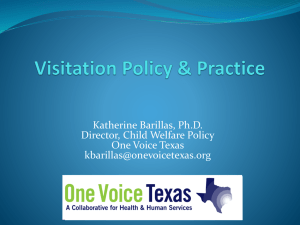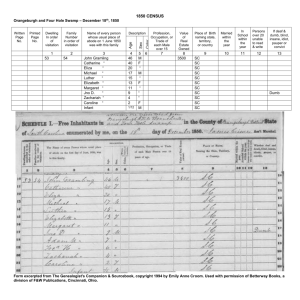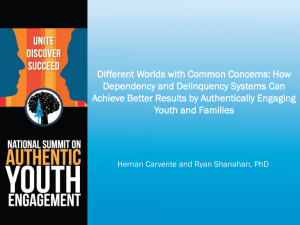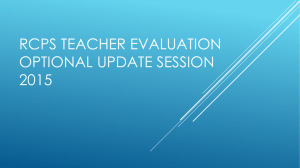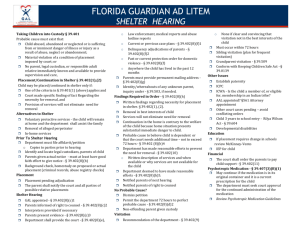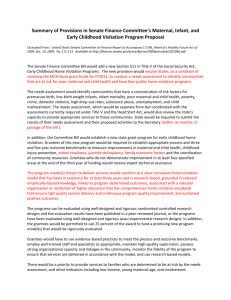2007 Legislative Update Summary
advertisement
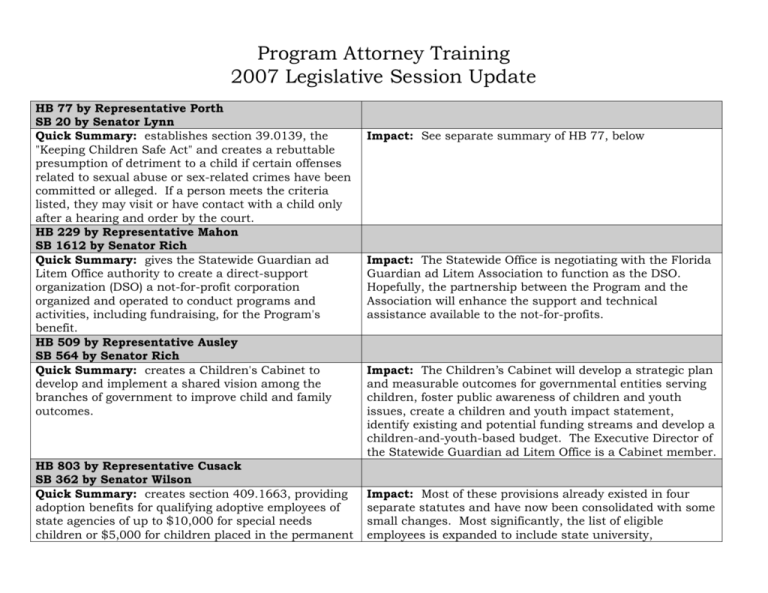
Program Attorney Training 2007 Legislative Session Update HB 77 by Representative Porth SB 20 by Senator Lynn Quick Summary: establishes section 39.0139, the "Keeping Children Safe Act" and creates a rebuttable presumption of detriment to a child if certain offenses related to sexual abuse or sex-related crimes have been committed or alleged. If a person meets the criteria listed, they may visit or have contact with a child only after a hearing and order by the court. HB 229 by Representative Mahon SB 1612 by Senator Rich Quick Summary: gives the Statewide Guardian ad Litem Office authority to create a direct-support organization (DSO) a not-for-profit corporation organized and operated to conduct programs and activities, including fundraising, for the Program's benefit. HB 509 by Representative Ausley SB 564 by Senator Rich Quick Summary: creates a Children's Cabinet to develop and implement a shared vision among the branches of government to improve child and family outcomes. HB 803 by Representative Cusack SB 362 by Senator Wilson Quick Summary: creates section 409.1663, providing adoption benefits for qualifying adoptive employees of state agencies of up to $10,000 for special needs children or $5,000 for children placed in the permanent Impact: See separate summary of HB 77, below Impact: The Statewide Office is negotiating with the Florida Guardian ad Litem Association to function as the DSO. Hopefully, the partnership between the Program and the Association will enhance the support and technical assistance available to the not-for-profits. Impact: The Children’s Cabinet will develop a strategic plan and measurable outcomes for governmental entities serving children, foster public awareness of children and youth issues, create a children and youth impact statement, identify existing and potential funding streams and develop a children-and-youth-based budget. The Executive Director of the Statewide Guardian ad Litem Office is a Cabinet member. Impact: Most of these provisions already existed in four separate statutes and have now been consolidated with some small changes. Most significantly, the list of eligible employees is expanded to include state university, custody of the department or with a licensed childplacing agency. SB 1088 by Senator Crist HB 7083 by Safety & Security Council Quick Summary: creates the Office of Criminal Conflict and Civil Regional Counsel to represent people in criminal and delinquency cases and in those cases where people are entitled to court appointed counsel under the federal or state constitution or as authorized by general law under chapters 39, 390, 392, 397, 415, 743, 744, 984 and section 393.12. community college and county school district employees. Impact: This will be a major change in the way representation is provided to indigent persons. The five criminal conflict and civil regional counsels will be appointed and begin terms by July 1. Some regions may begin operation by October 1 and offices are to be fully operational by January 1, 2008. The bill also revises provisions regarding the appointment and compensation of conflict counsel (including private counsel in dependency proceedings). SB 1388 by Senator Storms HB 1309 by Representative Galvano Quick Summary: Renames the "Office of Child Abuse Impact: The Office is to develop a state plan for the Prevention" the "Office of Adoption and Child Protection" promotion of adoption, support of adoptive families, and in this bill. prevention of abuse, abandonment, and neglect of children by December 31, 2008 with stakeholders including representatives of the Guardian ad Litem Program. Section 409.166 revises and renames the subsidized adoption program the "Adoption Assistance Program". The definition of "special needs child" is expanded to include developmentally disabled children and children "for whom a reasonable but unsuccessful effort has been made to place the child without providing a maintenance subsidy." Subsidy amounts can change but only with the adoptive parents' consent. The adoptive parents must enter into an agreement with the department specifying the assistance and services to be provided, but this is a one-time requirement and no longer an annual requirement. SB 1394 by Senator Storms Quick Summary: authorizes reorganization of the department. Impact: The department districts will be realigned to conform with judicial circuits. The department must integrate substance abuse and mental health programs into its overall structure and priorities. Section 893.13 now provides anyone who "knowingly falsifies, alters, destroys, defaces, overwrites, removes, or discards an official record relating to an individual in the care and custody of a state agency, which act has the potential to detrimentally affect the health, safety, or welfare of that individual, commits a felony of the third degree . . . ." SB 2114 by Senator Rich HB 1215 by Representative Glorioso Quick Summary: section 322.09, allows caseworkers to sign a minor's application for a learner's driver's license without assuming liability for any damages caused by the minor. section 409.1451, expands eligibility for independent living transition services (including the Road to Independence Program) to children who "after reaching 16 years of age were adopted from foster care or placed with a court-approved dependency guardian and have spent a minimum of 6 months in foster care within the 12 months immediately preceding such placement or adoption." mandates all children eligible for subsidized independent living services be formally evaluated for placement in such an arrangement. revises eligibility for the Road to Independence Program to encompass young adults who have earned a standard high school diploma or its equivalent, a special diploma or special certificate. creates section 743.044, to allow removal of disability of non-age of minors to secure depository financial services such as checking and savings accounts when children have reached 16 and meet certain statutory criteria. Impact: A youth can obtain a learner's permit with the caseworker's signature if the foster parent is notified and the court approves it as part of the transition plan. An appropriation was provided for the expansion of eligibility for independent living transition services, enabling more youth to access life skills services, aftercare services and the Road to Independence Program (and therefore Medicaid). Information regarding the availability of such services should be provided to the youth prior to case closure. Children who are 16 years of age and meet statutory criteria should have the disability of non-age removed to enable them to open checking and savings accounts. Summary of HB 77 Section 39.0139, Florida Statutes (2007) Visitation or other contact; restrictions Intent: to protect children and reduce the risk of further harm to children who have been sexually abused or exploited by a parent or other caregiver by placing additional requirements on judicial determinations related to visitation and other contact. What to look for: Cases when a parent or caregiver: Has been the subject of a report to the child abuse hotline alleging sexual abuse of any child as defined in § 39.01; Has been found guilty of, regardless of adjudication, or has entered a plea of guilty or nolo contendere to, charges under the following statutes or substantially similar statutes of other jurisdictions: o Section 787.04, relating to removing minors from the state or concealing minors contrary to court order; o Section 794.011, relating to sexual battery; o Section 798.02, relating to lewd and lascivious behavior; o Chapter 800, relating to lewdness and indecent exposure; o Section 826.04, relating to incest; or o Chapter 827, relating to the abuse of children; or Has been determined by a court to be a sexual predator as defined in § 775.21, or has received a substantially similar designation under laws of another jurisdiction. What is the effect: If the parent or caregiver meets the criteria above, a rebuttable presumption of detriment to a child is created and there can be no visitation or contact before a hearing and court order. What to do: If someone meets any of the criteria above, a hearing must be held and an order must be issued by the court before allowing visitation or other contact. If the court orders visitation without a hearing (or fails to address the issue), ask for a hearing. At the hearing: The court will determine whether the person proves by clear and convincing evidence that the safety, wellbeing, and physical, mental, and emotional health of the child is not endangered by such visitation or other contact. The court must appoint an AAL or a GAL. Any AAL or GAL appointed shall have special training in the dynamics of child sexual abuse. The court may receive and rely upon any relevant and material evidence submitted, including written and oral reports, to the extent of its probative value even if these reports and evidence may not be competent in an adjudicatory hearing. Findings by the court: The court will determine whether the person proves by clear and convincing evidence that the safety, well-being, and physical, mental, and emotional health of the child is not endangered by such visitation or other contact. If so, the presumption is rebutted and the court can allow visitation or other contact. The court has to enter a written order specifying any conditions it finds necessary to protect the child. If not, the court has to enter a written order prohibiting or restricting visitation or other contact with the child. If there will be visitation or contact it has to be: o supervised by a person who has previously received special training in the dynamics of child sexual abuse; or o conducted in a supervised visitation program. (The statute says that the only programs that can be used for these cases must have an agreement with the court and a current affidavit of compliance on file with the chief judge affirming the program complies with Florida Supreme Court Standards, and has a written agreement with the court and with the department as described in § 753.05 which deals with referrals involving child sexual abuse.) Protection against influencing testimony: If a party or participant is told by the child, or has other firsthand knowledge that a person is attempting to influence the testimony of the child, the court shall immediately suspend visitation or other contact. The court shall then hold a hearing and determine whether it is in the best interests of the child to prohibit or restrict visitation or other contact. If a child is in therapy because of the allegations or convictions in § 39.0139(3)(a) and the child's therapist says the visitation or other contact is impeding the child's therapeutic progress, the court shall hold a hearing within 7 business days to review the terms, conditions, or appropriateness of continued visitation or other contact.


